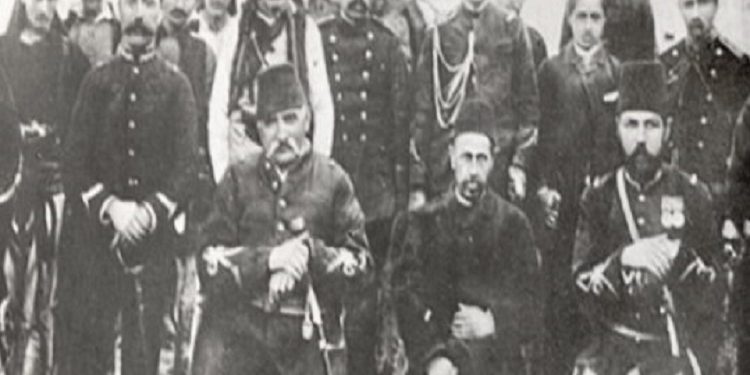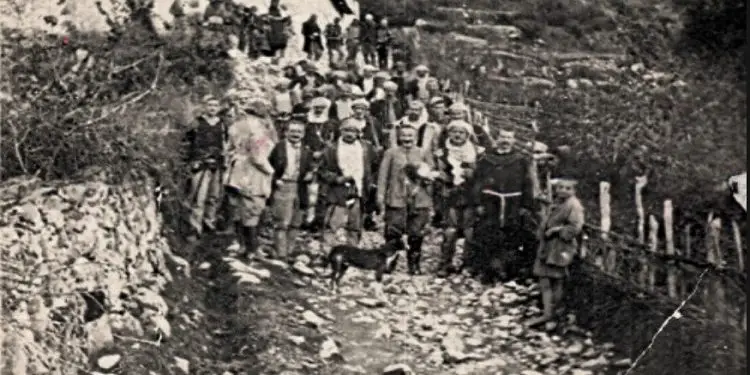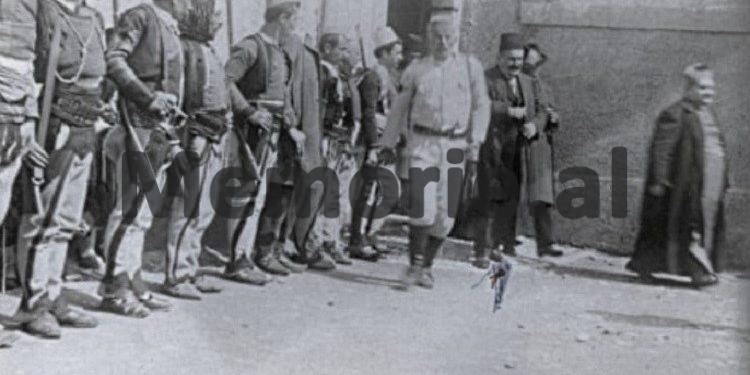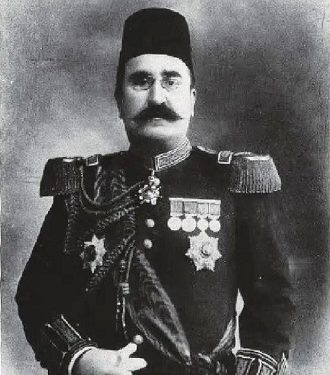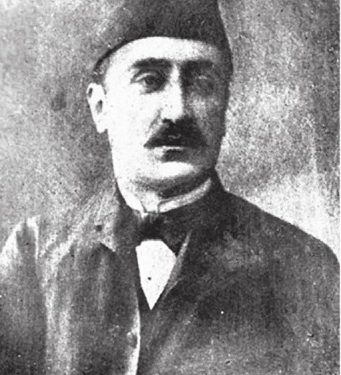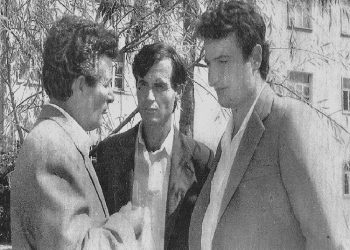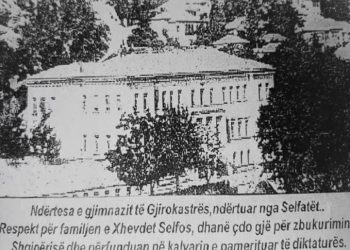By Dr. Nikol Loka
Part twenty-five
“PRENGA BIBE DODA, THE SHADOWS OF A CITIZENSHIP”
Memorie.al / The newest book “Prengë Bibë Doda, a phenomenon in Albanian political life”, by researcher Nikollë Loka, not only expands the scope of historical studies on Mirdita, the Door of Gjonmarkaj and the figure of the Mirdita Prince, Prengë Bibë Doda, but it is also a contribution to national historiography. The very rich archival material, the literature used or consulted, oral traditions, etc., make this book a real study treasure, giving the science of history a scientific monograph that enriches our knowledge of Mirdita, its captains, tradition, history etc. Studying such an important and complex figure, such as the figure of Prengë Biba Doda, is a high scientific responsibility that not everyone undertakes. Nikollë Loka, has done a great job of research and treatment by the professional researcher, giving us the portrait of the Prince and the general Mirditor, with the true contours. Dr. Loka has adhered to the end of the space and time, in which the multidimensional events and their protagonists have developed.
THE MONOGRAPH “ABOUT BIBË DODA, A PHENOMENON IN ALBANIAN POLITICAL LIFE”, A VALUABLE SCIENTIFIC STUDY THAT ENRICHS THE FUND OF OUR HISTORICAL STUDIES
(By Mr. Sc. Murat Ajvazi, March 2017, Switzerland)
Continues from last issue
When the situation in the south became critical, at the call of the Prince (who was increasingly called the King, Prenga mobilized volunteers from the North for help? But the armies prepared to be sent to the South were used to support the King and The government. The government of Vidi was surrounded by rebels. The Albanian army was weak and the support was counted on the volunteers who would be mobilized. Prengë Bibë Doda, Azis Pashë Vrioni, Bektash Cakrani and Ahmet Zogu responded to the King’s call for the defense of the country. Since the forces of the South were engaged on the front with Greece, the forces of the North were mainly responsible for suppressing the rebellion. On June 1, 1914, Prengë Bibë Doda was in Lezhë and was waiting for the order to depart. He had gathered a force of 8 thousand people consisting of: Mirditors, Shkodra, Lezjan and, mountaineers and from Lezha, would march towards Durrës. Armstrong, who served next to the King, writes: “We never learned how many men he had at his disposal at this time, but I believe that the government paid for some time, for five thousand to seven thousand people, although, in general, it was believed that the assembled force had never reached such a large figure”. (530) Even on June 13, Prenga was still in Lezha, with his forces. (531)
Regarding his delay in Lezhë, the newspaper “Populli” writes: “I blamed Prengë Biba Doda at that time, for his reluctance to go out, to go to his friends, but his reluctance, as if he went out then and back, it was not for nothing, but because there was, in me, the fraternal blood between the Albanians, and the delay we did in Lesh, there is no other reason, except that he got along better with the mouth, without needing to shed blood “. Hopes for the forces of Prengë Bibi Doda were high. On June 4, 1914, Prince Vidi sent Prenga a letter of thanks, where he congratulated him for the diligence shown in these difficult moments that the Motherland was going through and was grateful for his devotion to the Motherland and the nation. (532)
On June 16, Prince Vidi asked a thousand forces to go from Shengjin across the sea to Durrës, to reinforce the defense. (533)
The capture of Durres by the rebel forces forced the King to order Prengë Biba Doda to march towards Durres. Mustafa Kruja from Kruja, in a letter to Ahmet Zogu, in Qafë Murrizë, writes to him: “We found out that Preng Pasha has sauce from Lezhe, in the water of Mates. The morale of the rebels is badly shaken; they are scared by Preng Pasha. (534)
On June 19, 1914, General Prenga from Shëllinza, or Bregu i Mata, sent a letter to Mustafa Kruja in Kruja, where he wrote: “I clarified the work of Kruja, with a letter that Bibë Gjokë Paloka should bring to me, for decide how to do it, because I don’t know how to do this job”. (535)
Eventually, Prenga headed towards Ishmi, hoping that there would be no opposition from the residents there, but the opposite happened. The rebels decided to stay and asked for reinforcements. On June 21, 1914, Sadik Muharremi (Dume Herri), on behalf of the Council of Kruja, sent a letter to the Council of Shijak, where it was written: “The rebels of Kruja, Tutu, have taken Biba Doda to speak, the Njani from the hill of Mate, who was in Krue on a mission. They sent a help of 300 people to Ishem”. (536)
The forces of Prengë Bibë Doda entered Ishem on June 22, but encountered strong resistance from the locals, mobilized by Esad Pasha. Meanwhile, Prenga is forced to cease hostilities, by order of the Prince. Rebels require machine guns and support, with new forces. (537)
At this time, Kurbini had separated from the rebels and many villages had submitted their allegiance to Prengë Biba Doda. The rebels in Kruja had little strength left. The highlands were back with the state. Even most of the villages in the field had sent two representatives to Prengë Pasha, to express their obedience. (538)
Prince Vidi informed Prenga of the cease-fire until Wednesday morning and ordered him to hold his positions and be ready to respond if he is attacked by surprise. At the end of the royal order, it was written: “After the truce passes, if you do not receive a second order, by Wednesday, you will have your freedom of action.” (539)
On June 23, Prince Vidi informed Prenga that; “Talks with the insurgents did not yield any results and the truce ends at eight o’clock in the afternoon. Take the offensive. I have faith in your devotion to the Motherland and to me.” (540) The attack of the Mirditas began in a disorganized manner. Marka Gjoni, did not accept that his forces, for ease of action, were divided into detachments, accompanying each of them with 10 gendarmes and without taking any security measure, attacked Rrashbulli.
The insurgents who had landed at the foot of Rrashbull met the Mirditas with fierce fire, defeating them with great losses. The government planned to surround the rebels and force them to surrender. We accompanied the Northern army, led by Prengë Biba Doda, until its arrival in Šëllinze. After this, we hear no more of it as an attacking force, and it gradually withdrew towards the North, (541) for fear of being surrounded by the rebel army, coming from the Kruja Plain. Meanwhile, Ahmet Zogu had followed the situation from afar. Waiting in Kruja for the development of the attacks of Marka Gjon and Prengë Pasha, after their defeat, he retreated to Mat. (542)
The departure of Prenga Bibi Doda’s forces left the capital surrounded. Prenga himself went to Durrës, requested by the King, because of the great influence he had on the Mirditas, because it was not always easy to deal with them. (543)
The power of the Albanian Government was already limited only to Durrës and Vlorë (until September 1 when it fell into the hands of the insurgents); in Central Albania, the power of the insurgents lay, the southern provinces were under the oppression of the Greek forces, the northeastern provinces were under constant pressure from the Serbs, while Shkodra was under the administration of international forces.
In an effort to resolve the situation, on July 11, the King invited 35 dignitaries to the Royal Palace, including; Ismail Qemalin, Monsignor Prend Doçin, Isa Boletini, Prengë Bibë Doda, Fuat Toptanin and Dom Nikoll Kaçorrin. The most debated issue in this meeting was the request to the Great Powers for the arrival in Albania of an International Military Power, in defense of the country. (544)
On July 20, an organization formed under the conditions of the crisis, which was called the “Albanian National Council”, was convened under the chairmanship of the King, where different opinions were expressed about the way out of the situation. Proposals were made for Albania to be divided into three governments: North under Prengë Bibë Doda, Central Albania under Esad Pasha and South under Ismail Qemalin. Others demanded the dissolution of the ministerial cabinet and the removal of the Prince”. (545)
The conflict with Esad Pasha
On August 10, Preng Bib Doda learned that the insurgents had occupied Lezha. He asks the Prince for permission to leave with his braves to protect their hearths. In the Palace, there were only 350 Mirditors, 300 Romanian volunteers and about 600 Kosovars, led by Bajram Curri and Isa Boletini. On August 20, the international troops left Shkodra, however, the international administration remained through the Council of Consuls, which controlled the local administration of Shkodra, headed by the Prince of Mirdita.
Finally, peace was signed in Kallmet between Mirdita and Shijak’s Muslim Central Committee. On August 27, the French Consul of Shkodra, Jean Beguin Billecocq, writes: “Hasan Bey Bushatlliu, one of the most important chiefs of Shkodra, accompanied by several nobles, left yesterday for Kallmet, to meet with Prengë Biba Doda.
He will negotiate peace on behalf of the insurgents, so that the Prince of Mirdita accepts the candidacy of the Turkish Prince, Burhane Eddine Effendi. Reconciliation between Muslims and Catholics is being encouraged by the Austrians, who see that Prince Wid’s position is becoming more and more difficult, preferring already the candidacy of another foreign prince, even a Muslim, to not accept that of Esat Pasha, who is suspected by those as a partisan of Italy. (546)
Even in that situation, Prince Vidi made the last attempt to save the Throne. He turned to the Great Powers, with the request to keep the pledge they had taken at the London Conference, to guarantee the independence and sovereignty of Albania and, for this purpose; he requested the formation of an international force of 3 thousand people to suppress the rebellion. But the Great Powers, being in conflict with each other, promised to help save only the lives of the Prince and his family, but had no intention of carrying out any military intervention. In these circumstances, when the First World War had begun, Prince Vidi was forced to leave Albania on September 3, 1914, after 181 days of unsuccessful rule.
Two days after Vidi’s departure, the rebels entered Durrës and on September 5, founded their “General Council” under the chairmanship of Mustafa Ndroqi…! A new Turkish commission arrived from Istanbul to direct the rebel forces in accordance with Turkish policy. The situation in Albania was deplorable. In the South, the Greeks burned and roasted, while the Northern Highlands had fallen into permanent anarchy. In that chaotic situation, Esad Pasha took advantage, who on October 2, 1914, after forcing the “General Council” of the Rebels to submit to him, declared himself “Chairman of the Provisional Government” and “Commander of the Powers of Armatosura”, of Albania. Italy hastened to immediately send to Durrës, as a representative near Esad Pasha, Baron Aliotti, its former minister near Vid. (547)
On the eve of the beginning of the First World War, Albania was placed in a complete anarchy. Shkodra and its surroundings were under the authority of a provincial commission. Mirdita returned to its previous state and was administered by Prengë Bibë Doda, Dede Coku, was declared governor of Lezha, the province of Malësia e Madhe and that of Dukagjin, were administered by their local chiefs. (548)
The Italian government engaged Prengë Bibë Doda to be the Chairman of the Government of Shkodra, but on condition (549) that he follows a more cooperative policy with Assad’s people. Prenga should apologize to Alush Lohe, for the order he had given, to turn him off the road with the English gendarmes. (550) Esad Pasha had a plan to conquer Shkodra and extend his rule there; starting with Shengjin, but the people wanted Prengë Bibë Doda as the rulerPasha. (552)
In the created situation, Esad Pasha had met with Prenga and they had reached an agreement that; the troops of the mountaineers and the Mirditas, to stay north of the Mat river, while Esad’s troops to the south, on the condition that Alush Lohja was appointed commander of the gendarmerie, being in agreement with the consuls, especially the Italian one; representatives of the highlanders at the Commission in Shkodër, a common friend of Prenga and Alushi should be chosen. With this agreement, bloodshed between Albanians was avoided. (553)
Prenga became an obstacle to Esad Pasha in extending his power in Lezhë and Shkodër. The Italian consul in Shkodër informs Rome about the conflict: “Esad’s attempt to establish a government in Shengjin in Lezha and the arrival of Alush Lohes with our torpedo boat, for this purpose, has provoked reaction and hostility against us, in all Assad’s opponents, determined to stay at all costs, including with weapons. Bibi Doda, in order not to be deceived by Esad and his other enemies, was forced to take a firm stand. Seeking an agreement with Esad, Bibë Doda has no intention of coming under his influence and authority. While in another relation, this same Consul, writes: “Today, Prenga told me sincerely that; if Esadi wants peace with me, for the sake of the country, it must be agreed to maintain the status quo, he in Durrës and I in Shkodër, according to the directive and instructions of your government. Esadi wants to teach me a sharp lesson, helped by Italy, this is not possible. Assad risks inciting civil war, while I risk losing Italy’s friendship. Prenga had maintained this attitude in the meetings he had with the Consul of Austria-Hungary”. (554)
According to the Italian Consul; “the efforts of Assad and Biba Doda to remain independent of each other does not mean that they had antagonistic relations, therefore it is in the Italian interest to keep them both connected to us, as much as possible be possible. We can connect with Biba Doda, both by cooperating to maintain order, and by giving him the necessary financial means to govern, as we did with Esad. (555) The Italians were interested in the conflict between Prenga and Assad not becoming too severe. They influenced Esad so that the disagreements between him and Biba Doda did not degenerate into open conflict. (556)
But they were worried, with the low popularity of Esad Pasha and the increasing popularity of Prenga Biba Doda. In the instructions that the Minister of Foreign Affairs of Italy sent to the Minister Plenipotentiary in Durrës, he writes: “We cannot trust Biba Doda, because his hostile attitude towards us, in the situation the country is going through, for eight months and especially now, when he has become a good element and moderator to maintain the status quo, it means submission of Assad’s Western Albania to him”. (557)
Italian anger towards Prenga was accompanied by economic austerity measures. On May 23, 1915, the Italian government stopped the subsidies, because of the attitude he had taken towards Alush Lohe. (558) Prenga Pasha seems to have won the conflict. Prenga differed from Esadi, that he had never shown greed for sovereignty and had not made statements that; “I will use all my strength and all my influence, in favor of the Prince”, as Esadi had done. Prenga had not tried to cause strife and had devoted all his care to the reconciliation of blood in his tribe. (559) Memorie.al
The next issue follows




